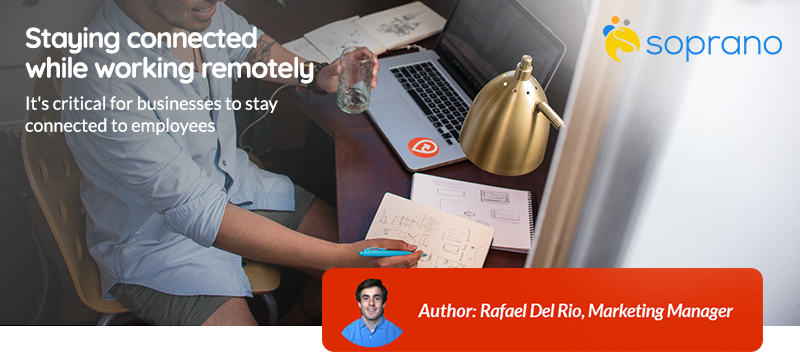
Since COVID-19 hit, many workplaces have started remote work practices for the first time. This has been a challenge, but one that everyone is rising to. Although you may be missing the office and your coworkers, working from home has many benefits.
One major benefit of remote work is the flexible schedule, which leads to a better work-life balance. You are able to have more time with your family, spend less time commuting and work from anywhere. Remote work also improves productivity due to fewer distractions and stress.
But to make any remote work environment successful, prioritizing connectivity is key.
Staying connected while working remotely
It is critical for businesses to stay connected to employees when remote working. Communication helps the organization stay focused and coordinated, all while building relationships and bonds!
In times like these, it is hard for people to focus on work with all the craziness going on in the world. With that in mind, it is very reassuring to have your line manager and colleagues show they care, help you adapt to this “new normal” and be supportive of you.
Humans are by nature social animals. An active social life has an incredible impact on our health and state of mind. Cutting this off from your working environment could result in loss of productivity, feelings of being lost with what you have to do and abrupt mood changes. This can then start affecting your employees’ personal life, causing a downward spiral. Staying connected is vital for everyone’s health.
When checking in with employees, ask them things like:
- If their job description and goals are clear.
- If they are staying motivated.
- If they are proud of what they do if they feel it’s important and worthwhile.
- How their working life is going.
- What could be done better to ensure everyone can keep having fun.
Advice for handling communication challenges
Unfortunately, there are aspects of communication that are lost when communicating online versus in-person. These include:
- Human connection.
- Freedom of having a disconnected conversation without being in front of an electronic device.
- Body language and social cues.
- The art of improvising.
- Chatting for the love of it.
There is no magic formula for the number of times you should get in contact with your team – it is a matter of understanding their needs and responsibilities. Here are some general tips for communicating effectively from afar:
- Sharing is caring! Check-in regularly, individually and/or together. Ask team members about themselves and how they are doing. Keep them informed about key issues. See if there is anything they wish to talk about.
- When digging into the work at hand, check if the instructions and priorities are clear and if there is anything they need help with and encourage them to get started.
- Praise your team for the good work they are doing.
- Try weekly or bi-weekly update emails about how everyone is doing and tasks/goals achieved.
- Online coffee breaks and happy hours are a great way to keep the social aspect of an office. Get everyone together at some time during the morning just to talk about whatever they want.
From your own research, you can also come up with different tools and practices that will challenge your team and keep them motivated. Encourage team members to get involved in these practices and give them credit for commitment and results.
To learn more about what Soprano is doing to help businesses and people stay connected, check out our blog.
